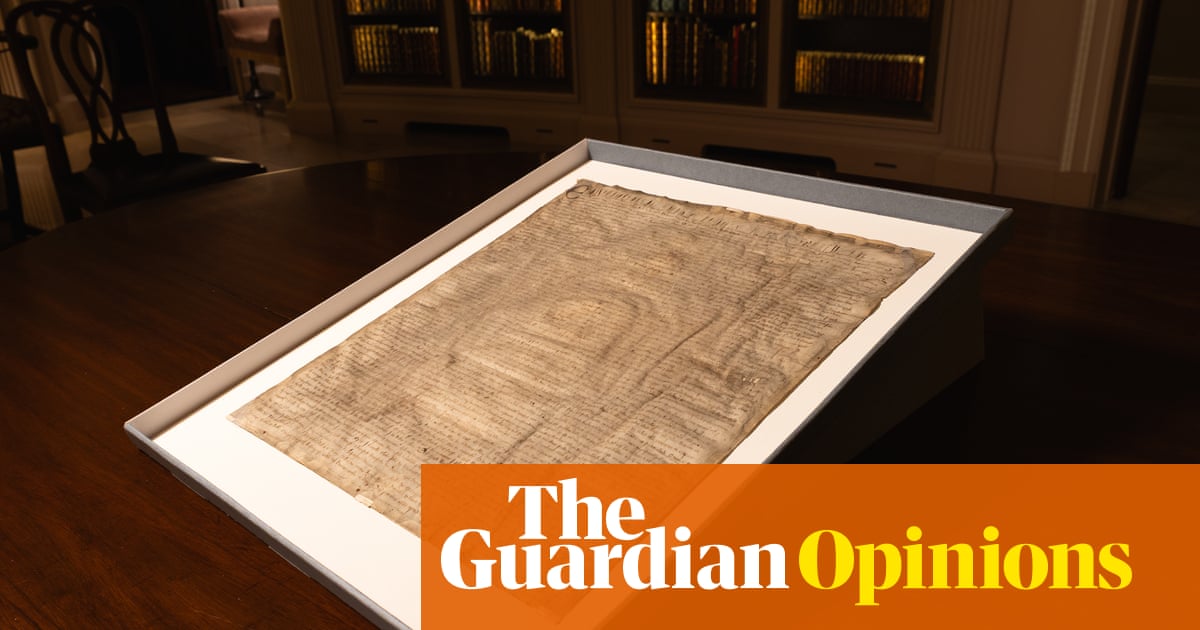Sometimes, miraculous financial windfalls happen when you need them most. A college student finding $20 in a jacket pocket on a Friday night. A relative who you didn’t really even like dropping dead and leaving you with a hefty inheritance. Or an institution of higher learning discovering they have an original copy of theMagna Carta. I’m sure you can relate.
Harvard Universityrecentlyfound the antiquities equivalent of a $20 billin its archives. What was once thought to be an unofficial copy of King Edward I’s declaration of principles is now confirmed to be one of seven remaining legitimate documents left in the world. Harvard purchased this item in 1946 for a whopping $27.50, or $452.40 in today’s money. Now that the piece’s provenance is confirmed, it’s fair to say it’s actually priceless.
I’m sure you’ve read the wholeMagna Carta, right? But if you haven’t, here’s the basics. The Magna Carta was drafted by Archbishop Stephen Langton as a means to squash a conflict between King John and a group of wealthy barons who felt they were being wrongly persecuted by the crown. The king accepted it in 1215. It laid out certain protections against undue royal influence over finance, justice and religious freedom, and created a council of 25 barons who would check the king’s authority. The Magna Carta fell in and out of favor and was only loosely adhered to, but King Edward reaffirmed the charter during his reign as a means of currying favor during a time of heavy taxation and to avoid a civil war.
It’s far from a perfect encapsulation of democracy, mostly because it focuses primarily on the rights of the wealthy barons, but it served as an inspiration to numerous nascent democracies around the world, including parliamentary Britain and the United States. It affirmed rights, granted authority to those outside the direct orbit of the crown, and created a system of checks and balances. Pretty handy thing to keep around. Not quite like a prenup, since the parties in question were unfortunately married already. More like a postnup that stipulated the rules of engagement for a couple that were already growing sick of each other. The British royal family and the people of the United Kingdom just can’t quit each other, can they?
This original copy of Edward’s reaffirmation of the Magna Carta, which apparently dates to 1300, is not something one can just hawk on eBay, but Harvard might want to consider at least talking to Sotheby’s. As of now,Donald Trumphas frozen almost$3bn in federal grants and contractsto the university to punish them for what he refers to as “radical left” ideology and the hiring of vocal liberals in positions of authority. The Magna Carta might not fetch $3bn (unlessJay-Z is feeling extra nostalgic). So, probably not the epic lottery windfall they would need. But, as it has always been, the Magna Carta is more valuable for its symbolism than its practical worth.
The Magna Carta affirms rights, but it also suggests that no person is above the law, that they can’t circumvent the rights of others on a whim. Thatsomeonehas to have the power to push back. That is, of course, anathema to the current American administration, which values loyalty and silence above all. That Harvard, which issuing Trump over his actions, has this symbol in its archive is a grand coincidence of history, but also a powerful reminder that humanity has been fighting blind autocracy for centuries. The powerful will always seek to possess and wield more power. The only thing that prevents tyranny is a shared belief in limits. Sound governance is a constant tug of war, both sides yanking at an invisible rope. If one side lets go of the rope, the other side inevitably falls over from the lack of opposition force. Then, we’re all in the mud, aren’t we? There is no system if one side gives up. The game is up.
I can’t imagine Trump actually wants to win that way. He thrives on a fight. He yearns for the joust of the campaign. Trump had arally to commemorate his first 100 daysjust because he missed the combative nature of a campaign speech. Ruling as a king is actually deeply lonely. It is against everything the US, perhaps the most ruthlessly competitive nation on Earth today, stands for. The Magna Carta should remind us all that it’s our duty to push back. Not just for the sake of democratic systems of government, but also to keep Trump from getting bored.
Let’s do everything we can to keep this elderly mind sharp. Trump needs a sparring partner. If not the liberal intellectuals, who will it be? Who else is there for him to complain about? He probably hasn’t hailed a cab in 30 years, so that won’t do. The cost of eggs? He probably doesn’t even know how much a dozen costs any more. This is our civic duty, folks. Think of it as elder care. If that man has nothing to fight against, what does his day look like? Some idle chit-chat with his aides? A Yankee game? Aquick trip to McDonald’s, perhaps? Maybe he can gotouch that orbagain. Or maybe he could read the Magna Carta. That’d be fun.
Dave Schilling is a Los Angeles-based writer and humorist
